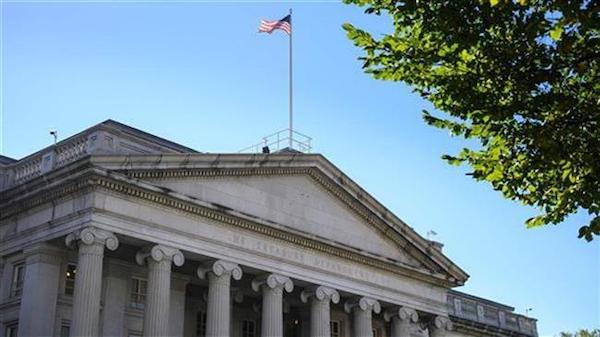
An AFP file photo taken on October 18, 2018, shows the US Treasury Department building in Washington, DC.
The administration of US President Donald Trump has in its final days in office imposed sanctions on Cubas interior ministry over accusations of rights abuses, with the government in Havana denouncing the hostile move as a "coercive measure" against the Caribbean nation.
The US Treasury Department announced on Friday that it was imposing sanctions on the Cuban Interior Minister Lazaro Alberto Alvarez Casas, days after Washington returned Havana to its list of "state sponsors of terrorism."
In a statement, the Treasury claimed that Jose Daniel Ferrer, a Cuban dissident, had in 2019 been detained in a prison controlled by the interior ministry and was reportedly beaten and tortured.
Citing Ferrers case, Treasury Secretary Steven Mnuchin said in the statement, "The United States will continue to use all the tools at its disposal to address the dire human rights situation in Cuba."
Cuban Foreign Minister Bruno Rodriguez rejected the US allegations and censured on Twitter the Trump administrations move as "a coercive measure against our country."
"The willful determination to single out Cuba comes from a regime that is leaving a legacy of isolation and defeat in foreign policy," he wrote.
Under the imposed sanctions, the Cuban interior minister and his department will no longer have access to the US financial system and their assets in the United States, if any, would be frozen.
The outgoing US government, which has been working for four years to reverse the historic rapprochement initiated by former US president Barack Obama between Washington and Havana, returned Cuba on Monday to the so-called blacklist of "state sponsors of terrorism."
Just nine days before the Republican lame duck president leaves office, US Secretary of State Mike Pompeo said Cuba was being blacklisted for "repeatedly providing support for acts of international terrorism" by harboring US fugitives as well as Colombian rebel leaders.
Pompeo said Cuba had hosted Colombias peace talks with rebels and claimed that it was harboring rebel leaders that the Colombian government now wanted returned.
The American diplomat also cited Communist-ruled Cubas security support for Venezuelan President Nicolas Maduro.
Trump has clamped down on Cuba since coming to power in 2017, tightening restrictions on US travel and remittances to Cuba, and imposing sanctions on shipments of Venezuelan oil to the island.
Trumps hardline Cuba policy was popular among the large Cuban-American population in South Florida, helping him win the state in November though he lost the election to Democratic candidate Joe Biden, who was Obamas vice president.
Biden, who will take office on January 20, said during a campaign rally that he would promptly reverse Trump policies on Cuba as such restrictive measures would complicate his efforts to ease tensions with Havana.
Russia, Norway slams US sanctions on Cuba
The Russian Foreign Ministry lashed out on Friday at the US recent decision to blacklist Cuba and said it was "a lie" that the island nation supports terrorism.
"When Washington accuses Havana of sponsoring terrorists, isnt it the very fake news that the United States is collectively fighting against? This is a lie that has been granted the official state status," said Maria Zakharova, the ministrys spokesperson.
At her weekly press briefing, Zakharova also denounced the US decision as "an unconstructive move," which clearly demonstrates Washingtons inability to pursue a consistent foreign policy based on objective realities.
Norway has also criticized the US move, saying placing a country on a terrorism list for hosting peace talks "could set a negative precedent for international peace efforts."
Cuba was first added to the terrorism list by the Reagan administration in 1982.
LINK: https://www.ansarpress.com/english/22040
TAGS:






























 online news tv
online news tv




